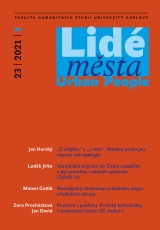Ukrajinská migrace do České republiky a její proměny v období epidemie COVID-19
DOI:
https://doi.org/10.14712/12128112.2376Klíčová slova:
Ukrainian migration, COVID-19, labour migration, Czech RepublicAbstrakt
After 1993, the Czech Republic became the target of Ukrainian migrants thanks to its economic development. The migration policy was then set in 2004 and this new political action made Ukrainian migration more controlled and vulnerable. At the same time, non-qualified or low-qualified migrants became the most important workforce. After the economic crisis in 2008, the Czech Republic aspired to receive highly qualified (and low-qualified “important”) migrants, and no suitable dispositions were created for nonqualified migrants. Following this trend, mobility was hindered overall by the epidemic of COVID-19 in 2020. In accordance with this situation, a new restrictionist policy was introduced by the Czech government; however, it did not have an impact on “lowering” immigration. The epidemic of COVID-19 also triggered “changes” for Ukrainian migrants on the job market, and this became an opportunity for non qualified migrants.
Stahování
Publikováno
Jak citovat
Číslo
Sekce
Licence
Copyright (c) 2022 Luděk Jirka

Tato práce je licencována pod Mezinárodní licencí Creative Commons Attribution 4.0 .


